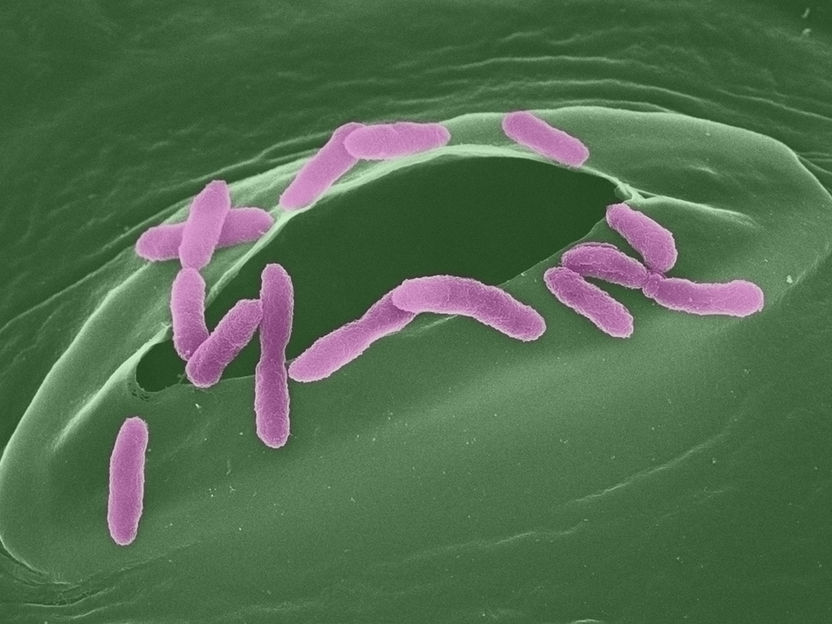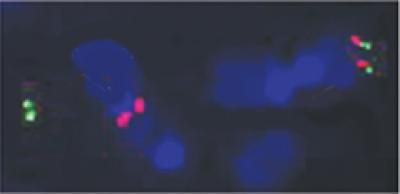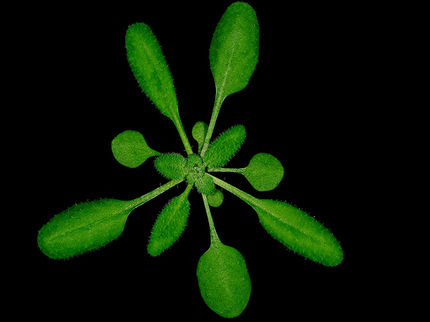Uniting with the enemy: how microbes protect against pathogens in plants
The findings could help to design natural alternatives to synthetic pesticides
Researchers at the Max Planck Institute for Biology Tübingen have discovered how benign strains of Pseudomonas protect against their harmful bacterial relatives. The study, now published in Nature Ecology & Evolution, shows that the coexistence of beneficial and pathogenic Pseudomonas on Arabidopsis thaliana improves plant health, but that the exact extent depends on the genetic makeup of both the plant and the microbes. The findings could help to design natural alternatives to synthetic pesticides.

False color image of Pseudomonas bacteria entering a plant leaf through stomata
Sonja Kersten, Max-Planck-Institut für Biologie Tübingen
Plants host microbes on their surface similar to humans host microbes on their skin or in the gut. The microbes may serve as health-promoting helpers or cause diseases. A research team around Or Shalev and Detlef Weigel aimed to further understand the benefits for the plant when Pseudomonas pathogens and Pseudomonas commensals coexist on the leaves of Arabidopsis thaliana, a model for plant research. Commensals are microbes that live on organisms and have either beneficial or neutral effects on the host. In particular, they examined the interrelation of Pseudomonas commensals and their plant protective effects against harmful isolates of the same strain.
“The outcome of a previous study of our department raised the question of how plants can host pathogens but still maintain health,” Shalev explains. “In agriculture many methods like pesticides or pruning are used to get rid of plant pathogens, therefore it is surprising to observe that many wild plants can live in harmony with their pathogens,” he adds. To create conditions as close to nature as possible, the researchers infected one group of plants with commensals only, another with pathogens only and a third group with a mixture of both commensals and pathogenic strains of Pseudomonas. The aim was to imitate the movement of the bacteria via wind and rain as well as growing the plants in soil rather than in plates. With genome barcoding they were able to track individual multi-strain consortium context regardless of their genome-wide similarity.
Genetic variation in both plant and bacteria matters
The research team observed a plant immune response induced by the existence of commensal Pseudomonas suppressing the growth of their pathogenic kindred. “This is not a trivial outcome, as all infecting bacteria were from the same genus, and despite their high relatedness the plant immune response specifically affected one pathogenic line. Moreover, the commensal consortium comprised a diverse set of commensal species, though none were suppressed by the plant, further demonstrating how taxon-specific the host-mediated suppression was,“ emphasizes Shalev.
However, there is apparently no “one size fits all” and it very much depends on the genetic makeup of both plant and bacteria whether the protection against pathogenic Pseudomonas works or fails. “Another important aspect of our work is the characterization of a collective protective effect. Rather than pinpointing specific individuals as the protectors, we found a synergistic effect of the collective,“ explains Shalev.
Implications for agriculture
The newly acquired knowledge could have importance for agriculture. By understanding exactly how healthy plants can live in harmony with colonized pathogens, this can also help to devise new techniques for agriculture to reduce the use of synthetic pesticides.
Original publication
Original publication
Shalev, O., Karasov, T.L., Lundberg, D.S. et al.;C"ommensal Pseudomonas strains facilitate protective response against pathogens in the host plant"; Nat Ecol Evol; 2022
Organizations
Other news from the department science

Get the life science industry in your inbox
By submitting this form you agree that LUMITOS AG will send you the newsletter(s) selected above by email. Your data will not be passed on to third parties. Your data will be stored and processed in accordance with our data protection regulations. LUMITOS may contact you by email for the purpose of advertising or market and opinion surveys. You can revoke your consent at any time without giving reasons to LUMITOS AG, Ernst-Augustin-Str. 2, 12489 Berlin, Germany or by e-mail at revoke@lumitos.com with effect for the future. In addition, each email contains a link to unsubscribe from the corresponding newsletter.
More news from our other portals
Last viewed contents
Kampo

Next-generation gene drive arrives - CRISPR-based 'allelic drive' allows genetic editing with selective precision and broad implications

microdrop Technologies GmbH - Norderstedt, Germany

Cellectis enters into strategic collaboration and investment agreement with AstraZeneca - Cellectis to receive up to $245M in cash, with potential for additional milestones, plus tiered royalties
Almirall completes deal with AstraZeneca in respiratory disease

Charles River Laboratories to Acquire Vigene Biosciences to Enhance Gene Therapy Capabilities - Further Expands Charles River’s Scientific Capabilities in the High-Growth Cell and Gene Therapy CDMO Sector
Family member with special connections - How the chaperone Ssb connects to the ribosome
Research for organic farming: Soya thrives on nitrogen from the air
American_Society_of_Hematology

Protein complex key in avoiding DNA repair mistakes, cancer - Lymphoma and other cancers may occur when a delicate gene recombination process in antibody-making cells goes awry

Dr. Marijn E. Dekkers to be new CEO of Bayer from October 1, 2010
























































